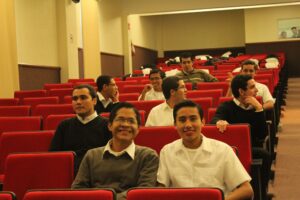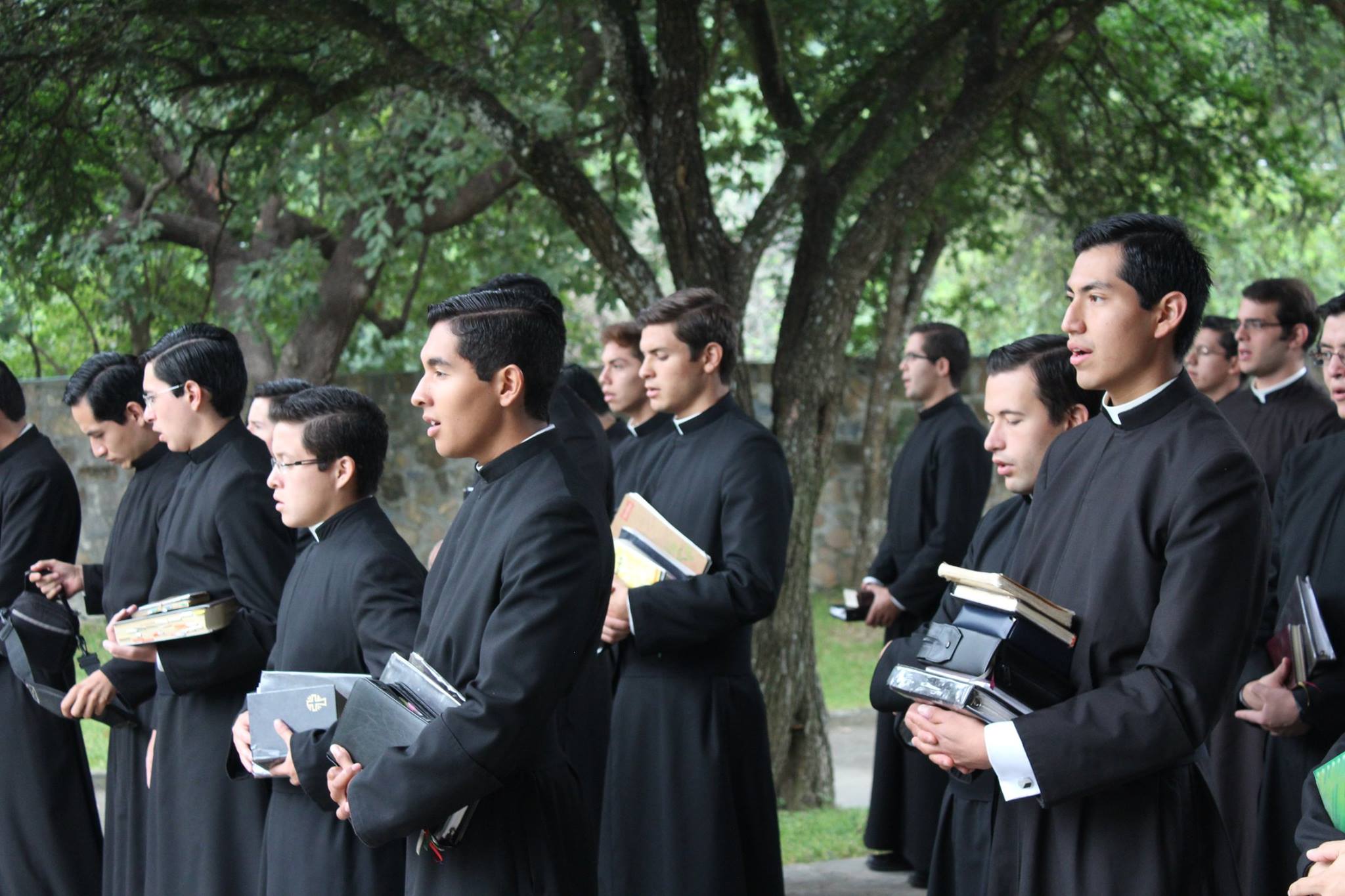The communication office of Regnum Christi in Mexico recently interviewed Father Jesús Cardier, LC, rector of the Novitiate and Humanities Center of the Legion of Christ in Monterrey. We present the interview below.
Érika Mondragón (EM): Father Cardier, could you explain to us: What is a Novitiate and who belongs to it?
P. Jesús Cardier, LC (PJC): The novitiate, which begins the life in a religious congregation, aims for young people who are discerning whether this is their vocation to better understand the vocation as lived in that religious family, to experience the way of life and its apostolate, to shape the mind and heart with its spirit, and to verify their intention and suitability (cf. Code of Canon Law, 646). Young people who have completed high school studies and are already over 17 years old can enter. Usually, this step is taken after a process of vocational discernment and a period that in the Legion we call candidacy.
EM: What importance does this stage have in the formation of a Legionary of Christ?
PJC: The novitiate is a key moment in the life of a legionary because it is where one seeks to know Christ personally to love Him more, follow Him, and then be able to proclaim Him to others. Additionally, it is a period in which the foundations of religious and priestly life are laid: prayer life, practice of virtues, deepening in faith, initiation into apostolate. The key is discernment to decide freely and out of love for Christ and humanity to dedicate one’s life to God through the vows of poverty, chastity, and obedience. The vows are made at the conclusion of the novitiate.
EM: What are the main studies during the Novitiate?
PJC: The novitiate is not strictly a period of studies like the humanities, philosophy, and theology. However, novices study subjects such as Christology, Sacred Scripture, liturgy, Christian spirituality, and Legionary spirituality, the documents of Vatican II, and other more recent ones on religious life. They also study Latin and Greek to be able to engage with the New Testament and Christian authors in their original languages. There are also classes in singing and an introduction to pastoral work and apostolate, with both theoretical and practical components.
EM: What apostolic activities are carried out during the novitiate?
PJC: Novices begin their apostolic activity by teaching catechism; guiding children, adolescents, and young people about their Christian duties, responsibilities as students, and behavior in the family; also promoting vocations to the consecrated life; evangelizing through missions in rural areas. Additionally, for one month each year, they dedicate themselves to manual or agricultural work to experience firsthand what people must do to support a family and enrich themselves through personal and team effort. For years, the novices in Monterrey have dedicated that month to reforestation of forested areas. There, the main apostolate is testimony and care for creation, which Pope Francis has emphasized so much.
EM: What are the main values that the Legion of Christ forms in young people entering the Novitiate?
PJC: We want to provide novices with the tools and guidance to become mature, integral men who are also good Christians and want to be apostles of Jesus Christ as religious and priests. Among the main values I think of are: giving God the first place in life, living to serve others following the example of Jesus Christ, coherence of life, rectitude of conscience, a mature and harmonious personality, strength of will, the ability to establish deep relationships with others, love for the Church and the Pope.
EM: What message would you give to young people who feel that God might be inviting them to become legionaries?
PJC: The same message that Pope Benedict XVI gave in his homily on April 24, 2005: “Whoever lets Christ in loses nothing, nothing, absolutely nothing of what makes life free, beautiful, and great. No! Only with this friendship do the doors to life open… Thus, today, I would like, with great strength and conviction, based on my long personal life, to tell all of you, dear young people: Do not be afraid of Christ! He takes nothing away and gives everything. Whoever gives himself to Him receives a hundredfold. Yes, open wide the doors to Christ, and you will find true life.”
EM: If a young person wants to get to know the Legionaries better and discern their vocation, what can they do?
PJC: The first step is to pray and ask Jesus Christ for light to discover His will. The Virgin Mary is also a great ally in this discernment process. I believe that the advice Jesus gave to His disciples is the wisest: “Come and see.” If they want to remove the thorn if this can be their vocation, they should visit us, go to a Legion community to be with them, see, ask everything they want, and start a journey. I would apply this same advice not only to those interested in becoming legionaries but also if they are considering another religious congregation or the diocesan seminary. Prayer and personal knowledge are key. It also helps a lot to seek advice from a good spiritual director or confessor.
EM: How does the novitiate end?
PJC: After two years of the novitiate, brothers who feel that this is God’s call for them and want to take the step make religious vows as Legionaries of Christ. It is a very emotional ceremony, in which each one states their name and then all together make their consecration to the Lord to be His tireless apostles. Their families often accompany them. It is beautiful to see the generosity of parents when God asks for a son to be entirely His. Yes, it is painful, but at the same time, it fills with joy and satisfaction to see them advance in the footsteps of Christ. From there, a formation path begins that will lead them through the study of classical humanities, philosophy, and theology, to then reach the priesthood. Thus, they are enriched culturally and humanly, growing in appreciation for the beauty and human values reflected in literature and art throughout history. They are also trained for preaching and attend workshops to help them write so they can effectively transmit the Gospel. Additionally, with the support of their formators, each brother puts into practice what they learned in the novitiate and also dedicates time to learning the art of apostolate to serve men and women better today as Legionaries of Christ.
EM: How can one help Legionary novices?
PJC: The first thing is prayer for them. Saint John Paul II never tired of reminding us how important it is for the Christian community to support vocations with prayer, to promote them, and encourage them. There are also people who contribute financially to help cover the costs of formation and maintenance of the brothers. We are extremely grateful and entrust their intentions to the Mass, because with great generosity and sometimes even sacrifices, they support us so that we never lack priests, who are the hands that bring us Christ.
EM: Any concluding message?
PJC: Last December, 44 Legionary priests were ordained in Rome. Some of them are alumni of our novitiate in Monterrey. I want to thank them for saying “yes” to Jesus Christ, to their families, and also to everyone who has accompanied them with prayer and support, because thanks to all of them, today they are priests of the Lord.
EM: In those ordinations, there were 16 Mexicans, who did their novitiate in Monterrey?
PJC: The novitiates in Monterrey were undertaken by Fathers Víctor Zamora, Fernando de Souza, Gabriel Arenas, Jorge Reyes, Joao Petroski, and Jorge Enrique Mújica.










